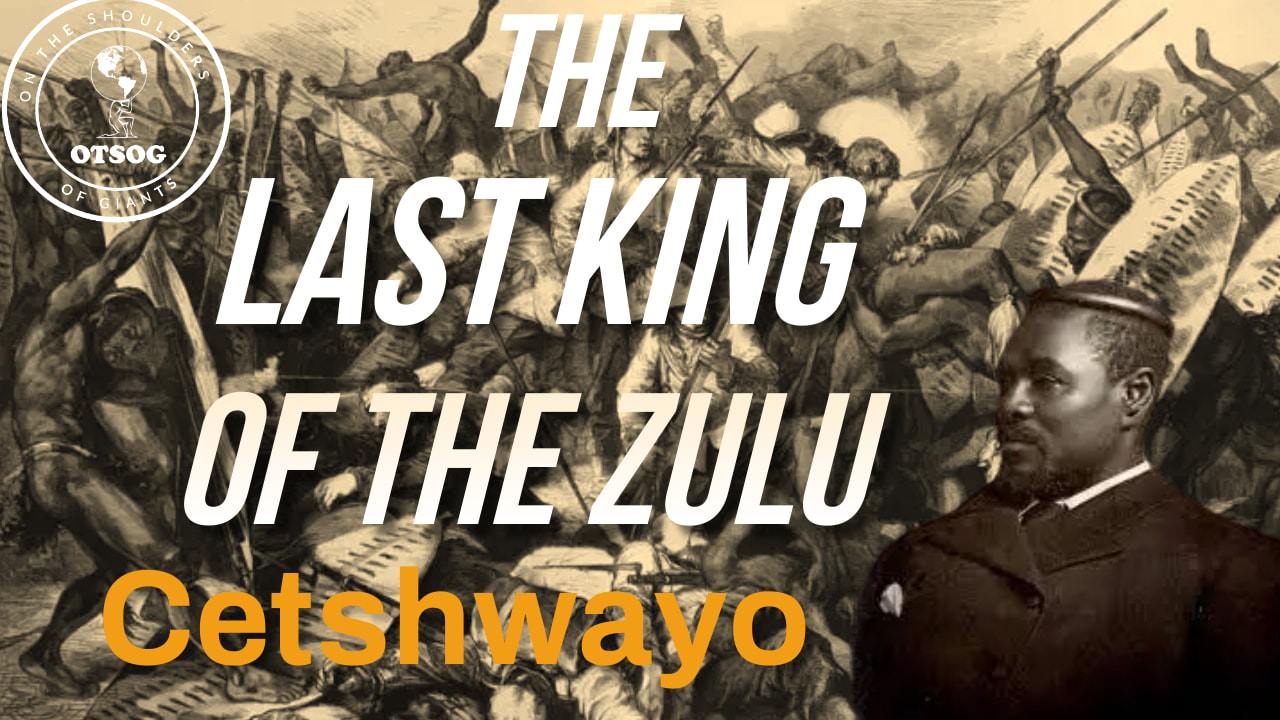|
During the early 1820s, the great Shaka was King of the Zulu Nation, who was in conflict against other factions of the Zulu who broke away to begin their own kingdoms. The battles were fierce and many of Shaka’s male family members were competing to become king of the Zulu. Mpande was the half-brother of Shaka and the father of Cetshwayo. At the time, Mpande was a Zulu warrior and soon-to-be king following the deaths of Shaka and Dingane. Cetshwayo was born in 1826 in Eshowe, Zululand but raised in Engakavini after Mpande fled Eshowe to preserve his life. In 1828, Shaka was assassinated by his brother Dingaan who then took the power of the Zulu Kingdom. Mpande and Dingaan would battle in 1840 with the Mpandes army being victorious making Mpande the King of the Zulu. After becoming the sole ruler of the Zulu Kingdom Mpande declared Cetshwayo the heir to the throne. Cetshwayo was described as a physically intimidating person, standing between 6’6 and 6’8, weighing around 350 pounds. Even though, Cetshwayo was the heir to the throne his brothers and other family members were now rivaling for his position. Mbuyazi, Cetshwayo’s brother was favored by their father while the Zulu lands were experiencing a severe drought. Cetshwayo was promised to be the successor of his father but Mbuyazi was being favored by Mpande at this time. Mbuyazi was given a large portion of the land and Mpande was not communicating with Cetshwayo about his succession. A civil war was already happening among the many factions of the Zulu kingdom. As Mbuyazi and his followers moved into the lands granted to them by Mpande, they were removing a number of Cetshwayo’s supporters. So a conflict between the brothers was inevitable. Cetshwayo and Mbuyazi engaged in the battle of Ndondakusuka, with Mbuyazi being backed by Mpande and others against Cetshwayo. The final outcome of the battle was Cetshwayo being the victor and was now a threat to take the throne from his father who supported Mbuyazi. Mpande was able to appeal to Theophilus Shepstone, the British Secretary for Native Affairs for help. Shepstone was able to get Cetshwayo and his father to agree to terms for the rulership of Zululand. Mpande would remain the king of Zululand while Cetshwayo would have control over Zululand. As time passed Cetshwayo would yield more power and influence than his father. Cetshwayo was adamant about eliminating any threat to his throne. Mpande died in 1872, giving Cetshwayo the full rulership of Zululand. In 1875, Cetshwayo and his army were prepared to defend their lands when the Boers began claiming parts of southern Zululand. Cetshwayo and his army caused the Boers to retreat and rethink their plans of battle. There was another problem and threat to Cetshwayo’s power, this threat was the British Empire. The British annexed the South African Republic in 1877 but were threatened by Cetshwayo’s growing Army. The British wanted to colonize Zululands without resistance. In 1878, the British gave the Zulu a choice to either give up their lands and sovereignty or be wiped out. Cetshwayo chose war and this was the beginning of the Anglo-Zulu War of 1879. The Zulu were a formidable opponent for the British. Actually, the British became cocky and underestimated the Zulu, despite the Zulu’s reputation for being fierce and victorious warriors. The Zulu were able to gain victories over the British, but they lost a decisive battle, the battle of Ondini. Cetshwayo was able to escape from the battlegrounds but he was eventually captured by British soldiers and imprisoned. Around 1882, Cetshwayo traveled to London and met the Queen of England, who granted him permission to return to his own land and rule a portion of the land. Cetshwayo began a rivalry with Zibhebhu, who was placed in charge of the northern Zulu lands by the British. Cetshwayo did challenge Zibhebhu’s army but was defeated and could not regain control of the lands that were now being controlled by the British. Cetshwayo died in 1888. Many believe he was poisoned by one of his rivals. We are not clear about how Cetshwayo died, but we do know that he is considered the last great Zulu king. To Cestchwayo and the mighty Zulu Kingdom, we proudly stand on your shoulders. J.A. Ward Click here to support the OTSOG book series. References: https://www.britannica.com/biography/Cetshwayo https://www.sahistory.org.za/people/king-cetshwayo https://en.wikipedia.org/wiki/Cetshwayo
0 Comments
Leave a Reply. |
Details
Categories
All
Click Here to join our mailing list
|
Contact Us: |
Connect With Us |
Site powered by PIT Web Design


 RSS Feed
RSS Feed



